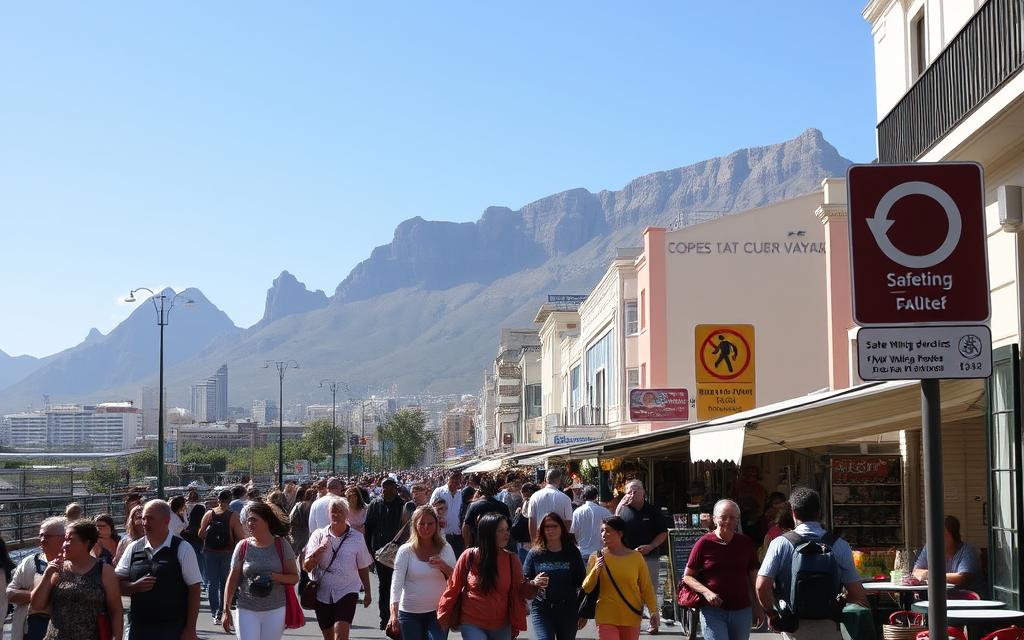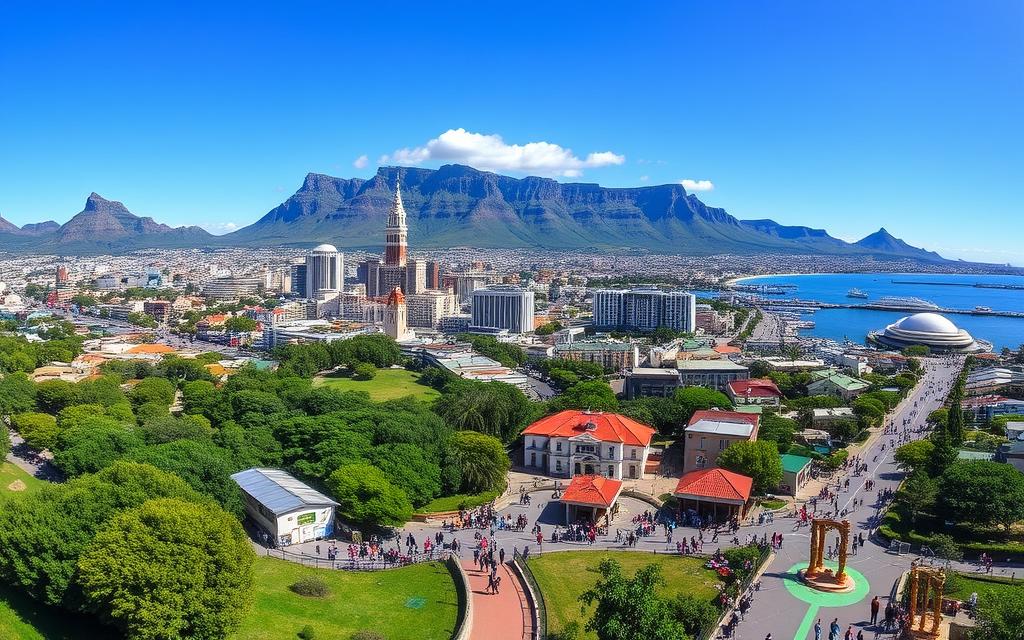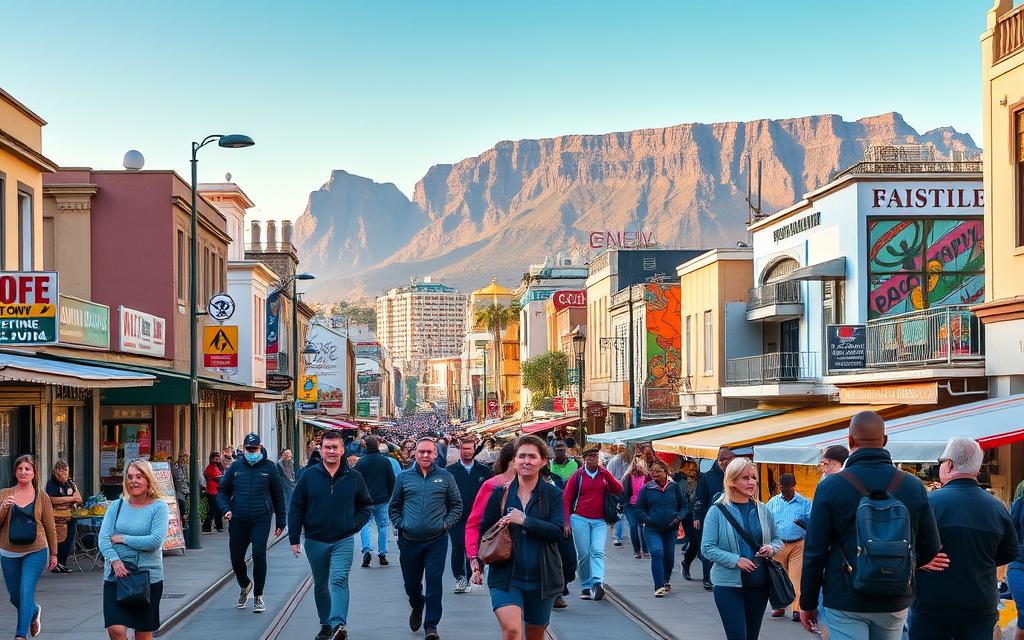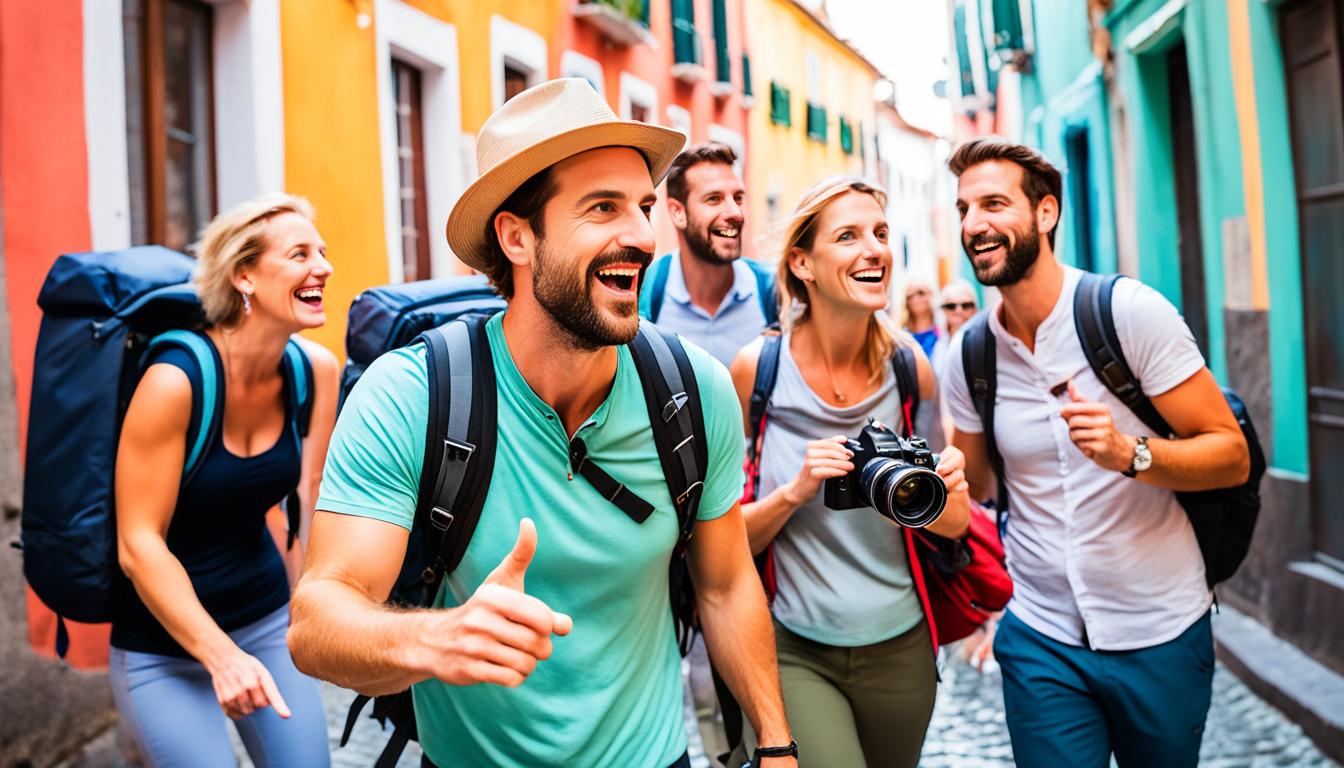Cape Town is famous for its beautiful landscapes and rich culture, attracting visitors worldwide. But, many wonder: Is Cape Town safe for tourists? Safety is a concern, but knowing the city’s safety can make your trip better. Areas like the City Bowl, Bakoven, and V&A Waterfront are safer, thanks to police and security measures.
Visitors can enjoy stunning views at Table Mountain and lively arts scenes. For a safe and fun trip, it’s important to follow local safety tips. This way, you can make the most of your time in Cape Town.
Understanding the Safety Landscape in Cape Town
Exploring Cape Town’s wonders is thrilling. But, knowing the crime rate and safety tips is vital. Cape Town is a top tourist spot, but it’s important to understand its safety to have a great trip.
Current Crime Rates in Cape Town
Cape Town’s crime scene is shaped by many factors. It has high homicide rates, ranking South Africa among the world’s top ten. The South African Police Service (SAPS) points out that crime rates are high in areas with socio-economic issues.
Common Types of Crime to Watch Out For
Visitors should watch out for certain crimes in Cape Town. Muggings and carjackings are common, especially outside tourist areas. Be careful with public transport, as it can be risky. Also, beware of pickpocketing in crowded places.
Areas to Avoid for Safety
Some areas in Cape Town are safer than others. Avoid townships like the Cape Flats and Nyanga due to high crime rates. But, places like Camp’s Bay and the Waterfront are safer. Using Uber at night can help avoid danger.
Knowing the crime rate and following safety tips can make your trip better. Always be aware of your surroundings and make smart choices during your visit.
Tips for Staying Safe While Exploring
Traveling to Cape Town means keeping yourself safe is key. It’s a beautiful city, but you must stay alert and take steps to protect yourself. By following some simple safety tips, you can enjoy Cape Town’s beauty without worry.

Best Practices for Personal Safety
Keeping yourself safe requires planning and common sense. Always know your route and avoid lonely spots, especially at night. Use GPS wisely and tell someone where you are.
Stick to busy areas and know the safe spots like Bakoven and Gardens. Avoid risky places like Cape Flats. Being alert and aware helps keep you safe in Cape Town.
Secure Your Belongings Effectively
Protecting your stuff is vital to avoid theft. Don’t show off expensive items like jewelry or gadgets. Use money belts or hidden pouches for valuable things.
Always lock your hotel room and use the safe for important documents. Watch out for pickpockets in crowded areas. Keeping your belongings safe is crucial for your safety in Cape Town.
Using Public Transport Safely
Choosing safe public transport is important in Cape Town. Use MyCiTi buses, which are safe and reliable. Don’t travel at night and prefer registered taxis or Uber if needed.
Be careful at transport stops and don’t carry too much cash. This helps keep you safe while using public transport in Cape Town.
Neighborhoods: Safe vs. Risky Zones
Exploring Cape Town can be thrilling and a bit scary. Knowing which areas are safe and following some safety tips can make your trip better. Let’s look at some neighborhoods you should visit and some you should avoid.
Overview of Safe Neighborhoods for Tourists
Cape Town has many safe spots for visitors. Places like *Camps Bay*, *City Bowl*, and *Bakoven* are beautiful and secure. The V&A Waterfront, with its 180,000 daily visitors, is also safe.
Luxury hotels here have extra security like CCTV and alarms. This adds an extra layer of safety.
Risky Areas to Approach with Caution
Not all parts of Cape Town are safe. Townships and some suburbs, like Kraaifontein, are risky. Places like *Langa* and *Nyanga* have very high crime rates and are not good for tourists.
Violent crimes happen more often in these areas, especially during holidays. Even Cape Town Central, while safer, has robberies and theft. So, always be careful.
How to Navigate Between Neighborhoods
Traveling through Cape Town’s different areas needs some planning and safety tips. Here are some tips:
- Avoid walking at night in places you don’t know.
- Think about renting a car or using Uber at night instead of public transport.
- Keep some emergency cash hidden and safe in a money belt.
- Stay alert and know your surroundings to avoid dangerous areas.
By following these tips, you can travel safely and enjoy Cape Town’s neighborhoods.
The Role of Local Authorities in Safety
In Cape Town, local authorities work hard to keep everyone safe. They do this by combining efforts of the police and emergency services. A strong police presence and quick emergency help are key to keeping the city safe for visitors.
Police Presence and Community Safety
The Cape Town police are more visible in important areas to boost safety. Places like the City Bowl and Camps Bay have more police, leading to fewer crimes. But, areas like Bo-Kaap see more crime compared to the CBD.
To fix these issues, the police focus on community policing. They work with locals and businesses to make everyone feel safe. This means tourists can explore with peace of mind, knowing the police are around.
Emergency Services: What to Know
Emergency services in Cape Town are well-organized and easy to reach. If you’re in an emergency, there are hotlines for help. Ambulance, fire, and rescue teams work fast to handle crises.
Cape Town also has programs like Shark Spotters to keep beaches safe. There are campaigns about dangers from wildlife like baboons and snakes. Visitors should keep important numbers handy for quick help if needed.
| Service | Contact Number |
|---|---|
| Police | 10111 |
| Ambulance | 10177 |
| Fire and Rescue | 021 480 7700 (from a cell phone) |
Knowing how the Cape Town police and emergency services work shows the city’s commitment to safety. It makes sure everyone can enjoy their visit without worry.
Health and Safety Considerations
When you visit a new place, health and safety are key. Cape Town is no different. It has many healthcare facilities and strict COVID-19 rules to keep everyone safe.
Healthcare Access for Tourists
In healthcare in Cape Town, you’ll find many options. From public hospitals to private clinics, they’re ready for any medical need. Places like Groote Schuur Hospital and Netcare Christiaan Barnard Memorial Hospital offer top-notch care.
COVID-19 Protocols and Health Measures
Cape Town takes COVID-19 seriously. It has strict rules like wearing masks in crowded areas and hand sanitizers everywhere. Following these rules helps keep everyone safe.
| Health Consideration | Details |
|---|---|
| HIV/AIDS | South Africa has more people living with AIDS than any other country, necessitating awareness and caution. |
| Cholera | Recent outbreaks reported in neighboring areas; ensure food and water safety. |
| Malaria | Not a concern in Cape Town but a risk in parts of northern KwaZulu-Natal and Kruger National Park. |
| Bilharzia | Symptoms include tiredness, abdominal pain, and bloody urine or stools; treatable with praziquantel. |
| Sunburn | Protective measures are necessary as sunburn can occur even on cloudy days. |
| Tick-Bite Fever | Ticks in the bush can transmit this fever; preventive measures include proper attire. |
By sticking to these health and safety tips, your trip to Cape Town will be safer and more fun. The city’s healthcare and COVID-19 rules show it cares about your well-being.
Tourist Attractions: Safety Ratings and Tips
Visiting Cape Town is a must for anyone who loves nature and history. Knowing about safety and following some tips can make your trip worry-free. We’ll look at some of the city’s top safe spots and share important safety advice.

Safe Attractions to Visit
Many attractions in Cape Town are great and safe for tourists. Here are some of the best:
- Table Mountain: A New Seven Wonder of Nature, offering amazing views. Always stay on the paths and consider a guided tour.
- V&A Waterfront: A lively area with shops, food, and fun. It’s one of the safe tourist spots in Cape Town, with security around.
- Robben Island: Famous for its history, especially Nelson Mandela’s time there. Official tours are safe and informative.
- City Bowl: Full of life and attractions like Company’s Garden and the Iziko South African Museum.
Tips for Enjoying Popular Tourist Spots
To have a great time and stay safe in Cape Town, follow these tips:
- Use Guided Tours: Choose guided tours for natural reserves or historical sites for safety and knowledge.
- Be Cautious with Belongings: Keep your things safe and don’t show off expensive items to avoid theft.
- Stay Informed: Listen to local advice and follow what authorities or guides say.
- Avoid Isolated Areas: Stick to busy places and avoid quiet areas, especially at night.
- Use Reputable Transport Services: Only use approved taxis or ride-sharing for safe travel to known spots.
| Attraction | Safety Rating | Key Safety Tip |
|---|---|---|
| Table Mountain | High | Stay on marked trails and consider guided hikes. |
| V&A Waterfront | High | Be vigilant with personal belongings in crowded areas. |
| Robben Island | High | Join an official tour for safe exploration. |
| City Bowl | Medium | Avoid isolated spots, especially at night. |
By focusing on safety and being careful, visitors can enjoy Cape Town’s culture and beauty fully.
Resources for Tourists Seeking Assistance
When exploring Cape Town, tourists have many resources to stay safe. These include emergency contacts, safety apps, and community support. They aim to offer quick help and the latest safety tips.
Local Contacts for Emergencies
If an emergency happens, call the local authorities right away. The emergency number in South Africa is 10111. It’s important to know this number because of the high crime rates.
Crime can include armed home invasions, carjacking, and muggings. Having this number ready can give you peace of mind and quick help when you need it.
Apps and Websites for Safety Updates
Stay informed and safe by using safety apps and websites. They give real-time updates on demonstrations and other dangers. Apps also warn about sudden weather changes, which is crucial for outdoor activities like hiking.
Having these resources at your fingertips can greatly improve your safety while traveling.
Community Support Services for Tourists
Cape Town’s community support services are very helpful for tourists. They offer advice for solo female travelers, like being careful and aware, especially at night. They also warn about scams, both online and offline, which are common in South Africa.
Using these services can make your visit safer and more enjoyable.
Source Links
- https://www.bhtp.com/blog/safe-travel-south-africa/
- https://budgettravelwithgabby.com/is-cape-town-safe/
- https://charlieontravel.com/cape-town-safe/
- https://aviator.indus.travel/is-cape-town-safe/
- https://www.plumguide.com/journal/cape-town-safety
- https://travel.gc.ca/destinations/south-africa
- https://www.gov.uk/foreign-travel-advice/south-africa/safety-and-security
- https://www.capetownvillas.net/safe-areas-stay-cape-town/
- https://www.thebrokebackpacker.com/is-cape-town-safe/
- https://www.drivesouthafrica.com/blog/is-cape-town-safe-for-tourists/
- https://www.frommers.com/destinations/south-africa/planning-a-trip/health–safety
- https://www.africaendeavours.com/destinations/south-africa/south-africa-travel-advice
- https://www.remoteyear.com/blog/is-cape-town-safe
- https://oursoulfultravels.com/is-cape-town-safe/
- https://travel.state.gov/content/travel/en/international-travel/International-Travel-Country-Information-Pages/SouthAfrica.html
- https://wandercapetown.com/info/cape-town-safety/

